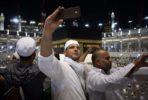The British embassy in Kuala Lumpur has questioned a claim by the Malaysian prime minister, Najib Razak, that his country’s anti-graft agency had cleared him of corruption, according to a diplomatic cable seen by the Guardian.
Malaysia’s anti-corruption commission (MACC) said in August last year that its investigation had found that nearly US$700m had been deposited into Najib’s personal bank account from unnamed “donors”.
It did not elaborate on the donor or why they transferred funds to Najib’s private accounts but said the money was not from the debt-laden state fund 1MDB, which had been the focus of the scandal.
Five days later, Najib told members of his ruling party that the MACC had cleared him of corruption allegations.
But a diplomatic telegram sent to London from the British High Commission in the Malaysian capital suggested the embassy queried that claim.
“Najib announced the MACC had exonerated him of corruption and the funds in his bank account were a donation from the Middle East and not from 1MDB,” it said.
“There has been no official MACC statement to this effect.”
Opponents of Najib, who denies taking money for personal gain, say the funds may have originated from 1MDB but were laundered internationally. Malaysia’s attorney general said in January 2016 that the money was a gift from the Saudi Arabian government.
The UK has been criticised for not speaking out more firmly against one of the world’s biggest financial scandals. Former British prime minister David Cameron was chided for meeting Najib shortly after the story broke last July.
The British cable was released under a freedom of information request made by the Guardian but was heavily redacted to include mostly factual reporting of events in Malaysia.
The Foreign and Commonwealth Office said the redactions were made as some of the information may “prejudice relations between the United Kingdom and other states if it was disclosed.
“In this case, the release of some information within diptel [diplomatic telegram] reporting could harm our relations with Malaysia.”
Najib sought to contain the greatest threat to his power by suspending two newspapers, removing a deputy who openly criticised him, and sacking the country’s top attorney, who had been leading the official investigation.
The man he replaced him with closed the case and ended the MACC investigation in January by clearing Najib, to the anger of opposition figures.
While Cameron’s staff said he had pressed Najib over claims he had stolen government money, the regional trip was intended to boost trade ties and coordinate efforts to fight ISIS.
However, several countries are conducting publicly-declared investigations into the alleged misappropriation of billions of dollars siphoned from 1MDB, which has debts of over US$11 billion and whose advisory board Najib chaired.
Switzerland said the sum suspected to have been stolen from 1MDB amounts to around US$4bn, some of which was transferred to accounts held in Switzerland by various former Malaysian public officials.
And the US attorney general announced it “seeks to recover more than US$1bn laundered through the United States”, the largest corruption investigation in the country’s history.
Najib contends the allegations are part of a opposition-led campaign to force him from office. 1MDB has also denied transferring funds to Najib.
The US investigation details a complex network of international transactions it says were used to launder money from 1MDB into high-end real estate in New York and Los Angeles, a US$35m jet aircraft, and paintings by Vincent Van Gogh and Claude Monet.
Funds are also alleged to have been diverted to make the 2013 film The Wolf of Wall Street, a Hollywood production about a corrupt stockbroker played by Leonardo DiCaprio.
The MACC has since announced it will cooperate with the FBI.
“The Department of Justice will not allow the American financial system to be used as a conduit for corruption,” US attorney general Loretta Lynch said.
The US complaint document alleged Najib’s stepson Riza Aziz bought a luxury home in Belgravia, London for £23.25m using diverted funds. It said misappropriated monies were also used to buy nearly £2m in services from a UK-based interior decorator.
The UK is reported to have started its own investigation, although this has not been officially confirmed.
The Guardian opened freedom of information requests into potential 1MDB investigations in the UK with the Home Office, HMRC, the Metropolitan Police, and the Serious Fraud Office during the past year.
All have been rejected.
Source: The Guardian







